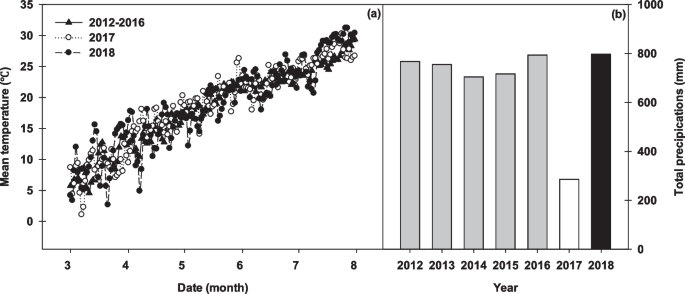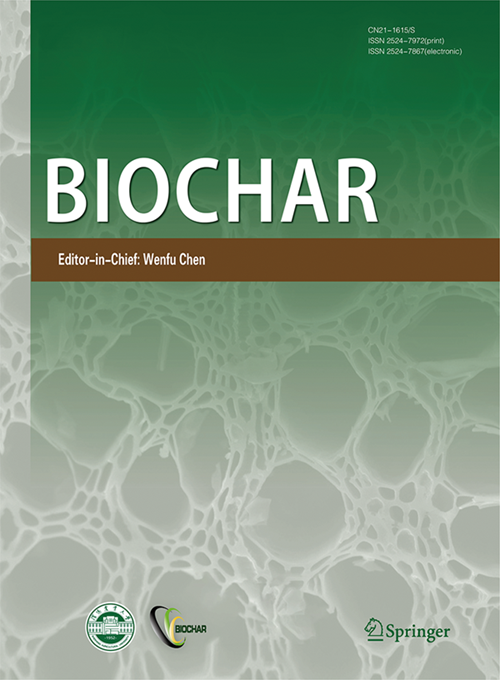Biochar improves soil properties and corn productivity under drought conditions in South Korea
IF 13.5
2区 环境科学与生态学
Q1 ENVIRONMENTAL SCIENCES
引用次数: 1
Abstract
Abstract Biochar has been shown to improve soil properties and plant productivity in soils with inherently low fertility. However, little has been reported for upland corns under dry and wet precipitation regimes. This study investigates the effect of biochar addition on a range of soil physicochemical, biological, and hydrological properties, and corn growth and productivity under agrometeorological drought and wet conditions. Here, experiments were laid out in a randomized complete block design with three replications at two sites during 2017 and 2018 in South Korea. Treatments included (i) CN: control (ii) IF: inorganic fertilizer (N–P–K) at 145–30–60 kg ha −1 ; (iii) BS: barley straw at 5 t ha −1 ; (iv) CWBC: corn waste biochar at 5 t ha −1 ; (v) CWBC + IF: corn waste biochar + inorganic fertilizer; (vi) CWBC + BS: corn waste biochar + barley straw. The year 2017 was relatively dry, whereas the year 2018 was wet. Despite drought conditions in the year 2017, biochar facilitated soil water conservation. However, higher precipitation in 2018 increased the quantity and distribution of soil water and nutrients in the top 15 cm. Biochar reduced soil bulk density, and increased porosity, cation exchange capacity and total organic carbon in both years but increased total bacterial counts during the dry year only. Bacterial population was generally higher under wet conditions. Similarly, more soil CO 2 was emitted in the wet year than in the dry year. Results further indicated that biochar can enhance corn biomass and grain yield regardless of precipitation conditions. The grain index was, however, affected by rainfall and was significantly different across treatments in the year 2018 only. All biomass, grain yield, and grain index were highest in CWBC + IF treatment and lowest under CN treatment. Indeed, biochar addition appeared to improve soil quality and soil conditioning effects in the drought and wet years, ameliorating soil and plant properties. Overall, biochar can improve water and nutrients storage, availability, and uptake, and therefore corn productivity during hydrological extremes. Graphical abstract

在韩国,生物炭改善了干旱条件下的土壤性质和玉米产量
生物炭在低肥力土壤中具有改善土壤性质和提高植物生产力的作用。然而,旱地玉米在干湿降水条件下几乎没有报道。本研究探讨了在农业气象干旱和潮湿条件下,添加生物炭对土壤理化、生物和水文特性以及玉米生长和生产力的影响。在这里,实验以随机完全块设计进行,在2017年和2018年在韩国的两个地点进行了三个重复。处理包括(i) CN:对照(ii) IF:无机肥(N-P-K), 145-30-60 kg ha - 1;(iii) BS: 5 t ha - 1的大麦秸秆;(iv) CWBC:玉米废料生物炭5吨/立方米;(v) CWBC + IF:玉米废生物炭+无机肥料;(vi) CWBC + BS:玉米废生物炭+大麦秸秆。2017年比较干燥,而2018年比较潮湿。尽管2017年干旱,但生物炭促进了水土保持。然而,2018年的高降水增加了顶部15 cm土壤水分和养分的数量和分布。生物炭降低了土壤容重,增加了土壤孔隙度、阳离子交换容量和总有机碳,但只在干旱年增加了土壤细菌总数。在潮湿条件下细菌数量普遍较高。同样,湿润年的土壤co2排放量也高于干旱年。结果进一步表明,无论在何种降水条件下,生物炭都能提高玉米生物量和产量。籽粒指数受降雨影响,仅2018年处理间差异显著。生物量、籽粒产量和籽粒指数均以CWBC + IF处理最高,CN处理最低。事实上,在干旱和潮湿年份,添加生物炭似乎改善了土壤质量和土壤调节效应,改善了土壤和植物的特性。总的来说,生物炭可以改善水分和养分的储存、可用性和吸收,从而在极端水文条件下提高玉米产量。图形抽象
本文章由计算机程序翻译,如有差异,请以英文原文为准。
求助全文
约1分钟内获得全文
求助全文
来源期刊

Biochar
Multiple-
CiteScore
18.60
自引率
10.20%
发文量
61
期刊介绍:
Biochar stands as a distinguished academic journal delving into multidisciplinary subjects such as agronomy, environmental science, and materials science. Its pages showcase innovative articles spanning the preparation and processing of biochar, exploring its diverse applications, including but not limited to bioenergy production, biochar-based materials for environmental use, soil enhancement, climate change mitigation, contaminated-environment remediation, water purification, new analytical techniques, life cycle assessment, and crucially, rural and regional development. Biochar publishes various article types, including reviews, original research, rapid reports, commentaries, and perspectives, with the overarching goal of reporting significant research achievements, critical reviews fostering a deeper mechanistic understanding of the science, and facilitating academic exchange to drive scientific and technological development.
 求助内容:
求助内容: 应助结果提醒方式:
应助结果提醒方式:


